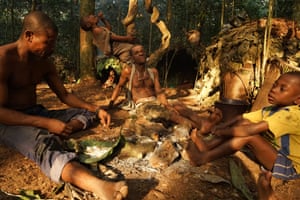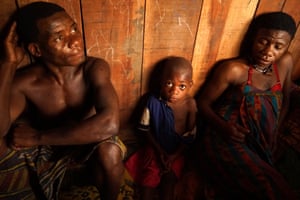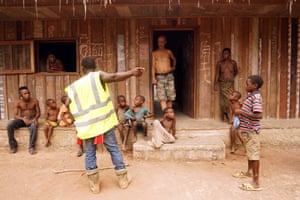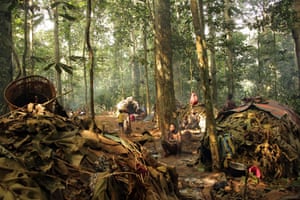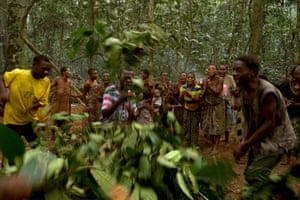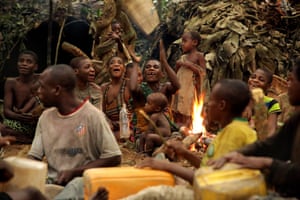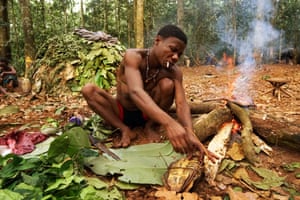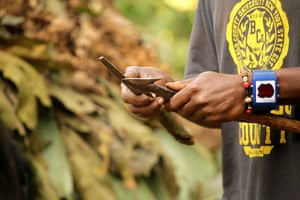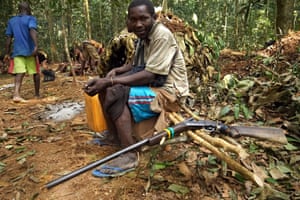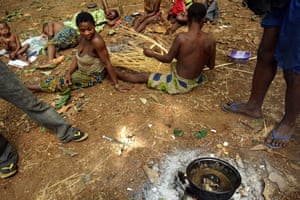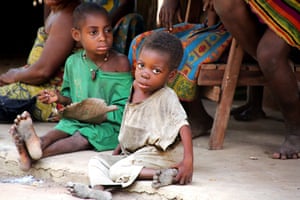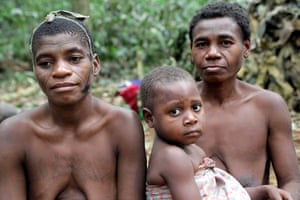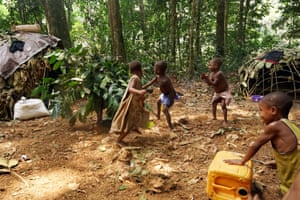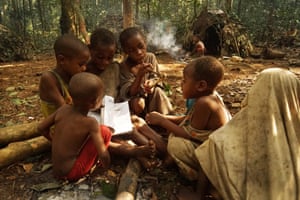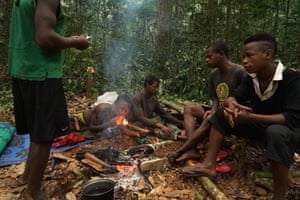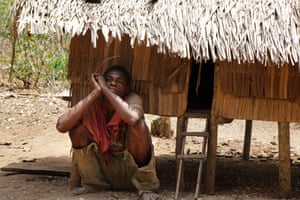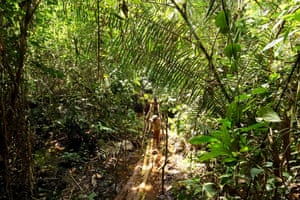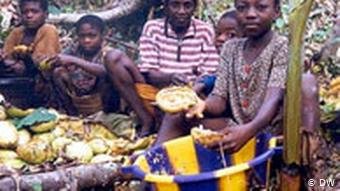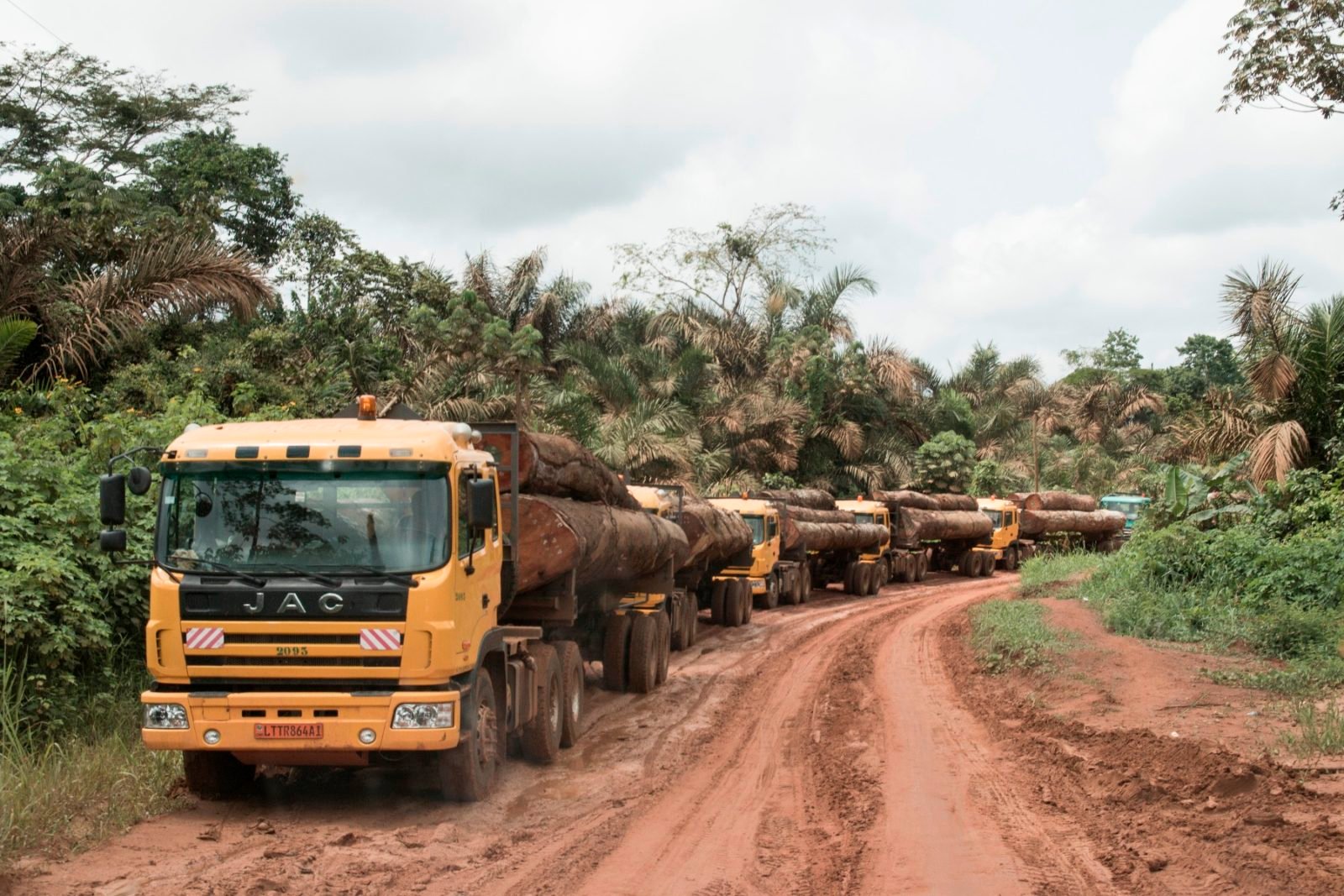Ethnicity and Wellbeing: The Lived Experiences of Baka Indigenous People of Cameroon
Robert D. Fai has a PhD in International Psychology from
The Chicago School of Professional Psychology, Washington, D.C.
Abstract
This paper examines ethnicity and wellbeing amongst the Baka indigenous people of Cameroon. The study scrutinized the socio-psychological problems being faced by the Baka indigenous people and the impact of these problems on wellbeing. To achieve this, a qualitative research methodology was adopted where in-depth interviews were administered to six Baka individuals from two Baka communities. Interview transcripts were analyzed using Nvivo software. Some of the themes highlighted several important findings: the need for organizations and governmental bodies to enact strategies that will allow for the recognition and respect of the Baka people, the need for the Baka people to access educational resources, a desire to be provided subsidized housing, and programs which will protect the Baka cultural heritage. Remarkably, those interviewed had a favorable view of the government’s desire to settle them on roadsides. They believe such a plan has allowed and will continue to permit Baka people access to more resources than they would otherwise have if they continue living in the forest. Additional findings provide guidelines that governmental as well as nongovernmental agencies will find useful for programs intervention and policymaking.
Keywords: Program intervention, indigenous people, psychosocial issues, wellbeing.
1.0 Introduction
Ethnic identity remains an important and defining element in the wellbeing of human beings. According to Chandra (2006), “…ethnic identities are a subset of identity categories in which eligibility for membership is determined by attributes associated with, or believed to be associated with, descent” (p. 3). Ethnic identity can be described as an umbrella term, one that denotes several attributes such as color, language, religion, tribe, race, and nationality (Chandra, 2006). Someone’s identity may from time to time become a target of injustice. For example, racial, ethnic, sex, gender or other social class discriminations are exhibited every day in our society, which often target one group or the other. When communities experience sociocultural impediments such as marginalization, stigmatization, and prejudice, such communities are exposed to risk factors. Some of these factors have been discussed by Jack, Ali and Dias (2014) as constituting depression, severe stress, poverty, and violence. An assessment shared by Phelan (2010), who posited that experiences of discrimination and stigma- related behaviors, can produce depressive as well as anxiety symptoms in addition to social isolation. Likewise, Pinel and Bosson (2013) have also posited that stigmatization has deleterious consequences, especially when those who are targeted focus empirically on their stigmatized status. Congruently, conflict between groups increases the chances of human distress and deterioration in wellbeing (Kelman, 2010). Whether it is fear of the unfamiliar or prejudicial behavior orchestrated against an outgroup, the way groups respond to such travesties is determined by socially constructed perceptions of the outgroup. Additionally, how social injustices are resolved lies with who manipulates power most. For example, David (2013) postulated that it is often difficult to persuade people, principally those who wield power, to take a keen interest in the experiences of vulnerable populations. He argued that it is difficult to convince dominant groups that social injustices faced by minorities are real, or that there is a need for steps to be taken to address such wrongs. Those who exercise power typically do not act when expected to do so. It is not unusual therefore, to hear them complain of their own injustices, notwithstanding their privileged positions in society. According to Goodman (2001), “people often become resistant to social justice issues or the plight of others when they are focused on their own distress or anxiety” (p. 70). A good case in point is the debate often heard from time to time in America, where proponents argue that African-American males are more likely to be killed by police than their Caucasian counterparts.
This issue has remained a bone of contention, with opposing sides often influenced by political affiliation not excluding other factors. From time to time, people who belong to dominant, powerful and advantaged groups also feel victimized and may complain about circumstances where they have been discriminated against or stereotyped (Goodman, 2001). In such situations they forestall accepting that an existing system may be broken, or that such a system is disadvantaging minority groups. While their concerns are genuine, it is unfortunate that sometimes lived experiences of minority groups are occasionally ignored or considered invalid or illegitimate. For instance, when some African Americans complain of police brutality and argue with the slogan that Black Lives Matter, some white people respond by stating that All Lives Matter, insinuating that blacks do not have genuine concerns. This is not unusual. According to Goodman (2001), for all groups, whether whites or wealthy men supposed to be privileged or heterosexuals, when they complain about advantages seized by an outgroup to which they have little or no access, such claims may be legitimate. Goodman (2001) argued that when dominant groups are preoccupied with their own concerns about their own injustices, their ability to be open and participate in self-reflective and critical educational processes may be inadequate.
Evidence-based research indicates that minorities (whether racial, sex determined, gender, or ethnic), who do not have access to power are often ostracized, negatively appraised, or often refused basic human rights by dominant groups in society (Goodman, 2001). This is true for the lived experiences of minority groups, including many indigenous people. The International Labor Organization (ILO) insists that the human rights of indigenous people must be respected (Article 3(1)). Unfortunately, the rights of many indigenous people are often violated, as with the lived experiences of the Baka indigenous people of Cameroon. According to Miller (1984, 1990) and as cited in Goodman (2001), unless individuals are given the opportunity to process and work through what hurts them, they will not be predisposed to acknowledge the distress of others. In like manner, people deny the pain of others in order to avoiding facing their own pain. Dominant and minority groups alike are eager to deal with what they perceive is their own maltreatment, and it is incredible to believe that they would have empathy for others.
1.1 Research Objective
This paper is based on the outcome of a PhD dissertation, whose goal it was to investigate the impact of concern for generativity and social identity threats on satisfaction with life amongst the Baka indigenous people. The utilization of Western concepts to understand ethnic populations like the Baka may seem incomprehensible. Nonetheless, Hofer, Busch, Chasiotis, Kärtner and Campos (2008), have stated that a cross-cultural investigation like this one can contribute to scholarship. Imada (2004) has argued that generativity allows for continuity and change within societies. The research focused on discovering the influence of psychosocial issues on satisfaction with life among the Baka indigenous people, as well as the opinions of selected Baka individuals on what can be done to improve their wellbeing. Three constructs were used to structure this study: generativity (McAdams, 2014; Guastello, Guastello & Briggs, 2014; Peterson, 2006; & McAdams, de St Aubin, Logan, 1993), defined as what the Baka people want to leave for posterity; social identity (Tajfel & Turner, 1979), described as who the Baka people are in the context of membership in their ethnic group; and finally, satisfaction with life, which is defined as overall assessment of one’s feelings and attitudes about life at a precise point in time (Diener, Emmons, Larsen & Griffin, 1985). The Baka people’s experiences are investigated from the perspective that they are encountering real challenges in life. Some of these are discussed by David (2013) as usually encountered by minorities, and include racial oppression, cultural oppression (such as sexism or heterosexism) internalized oppression, and/or the devaluation of an individual’s personal self. These concerns have had implications for both the physical and mental health of minority communities. This is true for communities like the Baka, who have been asked to abandon their homeland and reside in the outskirts of the forest that embodies their culture and way of life. Such demands have placed them in situations where they are forced to encounter psychosocial concerns that are assumed to negatively influence their health and wellbeing, and require scholarly attention.
2.0 Research Background
Indigenous peoples globally are experiencing marginalization and discrimination at all levels of their lives, and are exposed to poorer health situations than are many other majority groups (Ohenjo, Willis, Jackson, Nettleton, Good & Mugarura, 2006). Some of these indigenous people are the Baka Forest People, who live in Cameroon, Gabon and Congo-Brazzaville (Paulin, 2007). This research is based on the Baka of Cameroon, who are currently facing what has been described by many as denial by the Cameroon government and other major players with vested interest in the tropical forest in Southeastern Cameroon, of the Baka people’s right to access forest resources. This behavior is consequently alienating Baka people from their culture, and this is negatively influencing their welfare. Living in the forest and depending on it for their livelihood has been customary for the Baka people for thousands of years (Pyhälä, 2012). It is not certain if the Baka ethnic people will continue with their rich culture of oral tradition, manifested by a substantial number of rituals and traditional stories told by the elder Baka to the younger people discussed by Léonard (2011) in the face of rapid changes in their culture. According to McAdams (n.d), life stories may tell much about the culture in which those stories are told, as well as what they articulate about the teller of the story. For example, when Americans talk about their stories of redemption (McAdams, 2006) it is possible to decipher American cultural values. This is also true about Baka rituals and traditional stories. Léonard (1997) speculated that the Baka see their culture as intrinsically linked to the forest. Historically speaking, the Baka, as well as many of the other Forest People in the Central African sub-region such as the Mbuti, have suffered loss of resources and land to colonists, commercial enterprises, and organizations involved in conservation initiatives (Gilbert, Couillard & Kidd, 2009; Pyhälä, 2012). According to Popova (2014), conservation measures forced on indigenous people unleash poverty. It is important that the Baka people participate in decision-making processes such as may be the case with conservation issues that are
Evidence-based research indicates that minorities (whether racial, sex determined, gender, or ethnic), who do not have access to power are often ostracized, negatively appraised, or often refused basic human rights by dominant groups in society (Goodman, 2001). This is true for the lived experiences of minority groups, including many indigenous people. The International Labor Organization (ILO) insists that the human rights of indigenous people must be respected (Article 3(1)). Unfortunately, the rights of many indigenous people are often violated, as with the lived experiences of the Baka indigenous people of Cameroon. According to Miller (1984, 1990) and as cited in Goodman (2001), unless individuals are given the opportunity to process and work through what hurts them, they will not be predisposed to acknowledge the distress of others. In like manner, people deny the pain of others in order to avoiding facing their own pain. Dominant and minority groups alike are eager to deal with what they perceive is their own maltreatment, and it is incredible to believe that they would have empathy for others.
1.1 Research Objective
This paper is based on the outcome of a PhD dissertation, whose goal it was to investigate the impact of concern for generativity and social identity threats on satisfaction with life amongst the Baka indigenous people. The utilization of Western concepts to understand ethnic populations like the Baka may seem incomprehensible. Nonetheless, Hofer, Busch, Chasiotis, Kärtner and Campos (2008), have stated that a cross-cultural investigation like this one can contribute to scholarship. Imada (2004) has argued that generativity allows for continuity and change within societies. The research focused on discovering the influence of psychosocial issues on satisfaction with life among the Baka indigenous people, as well as the opinions of selected Baka individuals on what can be done to improve their wellbeing. Three constructs were used to structure this study: generativity (McAdams, 2014; Guastello, Guastello & Briggs, 2014; Peterson, 2006; & McAdams, de St Aubin, Logan, 1993), defined as what the Baka people want to leave for posterity; social identity (Tajfel & Turner, 1979), described as who the Baka people are in the context of membership in their ethnic group; and finally, satisfaction with life, which is defined as overall assessment of one’s feelings and attitudes about life at a precise point in time (Diener, Emmons, Larsen & Griffin, 1985). The Baka people’s experiences are investigated from the perspective that they are encountering real challenges in life. Some of these are discussed by David (2013) as usually encountered by minorities, and include racial oppression, cultural oppression (such as sexism or heterosexism) internalized oppression, and/or the devaluation of an individual’s personal self. These concerns have had implications for both the physical and mental health of minority communities. This is true for communities like the Baka, who have been asked to abandon their homeland and reside in the outskirts of the forest that embodies their culture and way of life. Such demands have placed them in situations where they are forced to encounter psychosocial concerns that are assumed to negatively influence their health and wellbeing, and require scholarly attention.
2.0 Research Background
Indigenous peoples globally are experiencing marginalization and discrimination at all levels of their lives, and are exposed to poorer health situations than are many other majority groups (Ohenjo, Willis, Jackson, Nettleton, Good & Mugarura, 2006). Some of these indigenous people are the Baka Forest People, who live in Cameroon, Gabon and Congo-Brazzaville (Paulin, 2007). This research is based on the Baka of Cameroon, who are currently facing what has been described by many as denial by the Cameroon government and other major players with vested interest in the tropical forest in Southeastern Cameroon, of the Baka people’s right to access forest resources. This behavior is consequently alienating Baka people from their culture, and this is negatively influencing their welfare. Living in the forest and depending on it for their livelihood has been customary for the Baka people for thousands of years (Pyhälä, 2012). It is not certain if the Baka ethnic people will continue with their rich culture of oral tradition, manifested by a substantial number of rituals and traditional stories told by the elder Baka to the younger people discussed by Léonard (2011) in the face of rapid changes in their culture. According to McAdams (n.d), life stories may tell much about the culture in which those stories are told, as well as what they articulate about the teller of the story. For example, when Americans talk about their stories of redemption (McAdams, 2006) it is possible to decipher American cultural values. This is also true about Baka rituals and traditional stories. Léonard (1997) speculated that the Baka see their culture as intrinsically linked to the forest. Historically speaking, the Baka, as well as many of the other Forest People in the Central African sub-region such as the Mbuti, have suffered loss of resources and land to colonists, commercial enterprises, and organizations involved in conservation initiatives (Gilbert, Couillard & Kidd, 2009; Pyhälä, 2012). According to Popova (2014), conservation measures forced on indigenous people unleash poverty. It is important that the Baka people participate in decision-making processes such as may be the case with conservation issues that are
Evidence-based research indicates that minorities (whether racial, sex determined, gender, or ethnic), who do not have access to power are often ostracized, negatively appraised, or often refused basic human rights by dominant groups in society (Goodman, 2001). This is true for the lived experiences of minority groups, including many indigenous people. The International Labor Organization (ILO) insists that the human rights of indigenous people must be respected (Article 3(1)). Unfortunately, the rights of many indigenous people are often violated, as with the lived experiences of the Baka indigenous people of Cameroon. According to Miller (1984, 1990) and as cited in Goodman (2001), unless individuals are given the opportunity to process and work through what hurts them, they will not be predisposed to acknowledge the distress of others. In like manner, people deny the pain of others in order to avoiding facing their own pain. Dominant and minority groups alike are eager to deal with what they perceive is their own maltreatment, and it is incredible to believe that they would have empathy for others.
1.1 Research Objective
This paper is based on the outcome of a PhD dissertation, whose goal it was to investigate the impact of concern for generativity and social identity threats on satisfaction with life amongst the Baka indigenous people. The utilization of Western concepts to understand ethnic populations like the Baka may seem incomprehensible. Nonetheless, Hofer, Busch, Chasiotis, Kärtner and Campos (2008), have stated that a cross-cultural investigation like this one can contribute to scholarship. Imada (2004) has argued that generativity allows for continuity and change within societies. The research focused on discovering the influence of psychosocial issues on satisfaction with life among the Baka indigenous people, as well as the opinions of selected Baka individuals on what can be done to improve their wellbeing. Three constructs were used to structure this study: generativity (McAdams, 2014; Guastello, Guastello & Briggs, 2014; Peterson, 2006; & McAdams, de St Aubin, Logan, 1993), defined as what the Baka people want to leave for posterity; social identity (Tajfel & Turner, 1979), described as who the Baka people are in the context of membership in their ethnic group; and finally, satisfaction with life, which is defined as overall assessment of one’s feelings and attitudes about life at a precise point in time (Diener, Emmons, Larsen & Griffin, 1985). The Baka people’s experiences are investigated from the perspective that they are encountering real challenges in life. Some of these are discussed by David (2013) as usually encountered by minorities, and include racial oppression, cultural oppression (such as sexism or heterosexism) internalized oppression, and/or the devaluation of an individual’s personal self. These concerns have had implications for both the physical and mental health of minority communities. This is true for communities like the Baka, who have been asked to abandon their homeland and reside in the outskirts of the forest that embodies their culture and way of life. Such demands have placed them in situations where they are forced to encounter psychosocial concerns that are assumed to negatively influence their health and wellbeing, and require scholarly attention.
2.0 Research Background
Indigenous peoples globally are experiencing marginalization and discrimination at all levels of their lives, and are exposed to poorer health situations than are many other majority groups (Ohenjo, Willis, Jackson, Nettleton, Good & Mugarura, 2006). Some of these indigenous people are the Baka Forest People, who live in Cameroon, Gabon and Congo-Brazzaville (Paulin, 2007). This research is based on the Baka of Cameroon, who are currently facing what has been described by many as denial by the Cameroon government and other major players with vested interest in the tropical forest in Southeastern Cameroon, of the Baka people’s right to access forest resources. This behavior is consequently alienating Baka people from their culture, and this is negatively influencing their welfare. Living in the forest and depending on it for their livelihood has been customary for the Baka people for thousands of years (Pyhälä, 2012). It is not certain if the Baka ethnic people will continue with their rich culture of oral tradition, manifested by a substantial number of rituals and traditional stories told by the elder Baka to the younger people discussed by Léonard (2011) in the face of rapid changes in their culture. According to McAdams (n.d), life stories may tell much about the culture in which those stories are told, as well as what they articulate about the teller of the story. For example, when Americans talk about their stories of redemption (McAdams, 2006) it is possible to decipher American cultural values. This is also true about Baka rituals and traditional stories. Léonard (1997) speculated that the Baka see their culture as intrinsically linked to the forest. Historically speaking, the Baka, as well as many of the other Forest People in the Central African sub-region such as the Mbuti, have suffered loss of resources and land to colonists, commercial enterprises, and organizations involved in conservation initiatives (Gilbert, Couillard & Kidd, 2009; Pyhälä, 2012). According to Popova (2014), conservation measures forced on indigenous people unleash poverty. It is important that the Baka people participate in decision-making processes such as may be the case with conservation issues that are compromising their future.
A study by Fai (2016) highlights the view that the Baka, as well as other indigenous inhabitants of the central African sub-region have been forced to live in vulnerable conditions that impact their wellbeing. This is so due not only to their dispossession from their ancestral homeland, the tropical rainforest, part of which is under exploitation by multinational corporations that are engaging in logging activities in the region. In addition, another limitation has been imposed upon them by organizations like the World Wildlife Fund (WWF), which is engaged in undertakings that target the conservation of the Central African rain forest. These activities and engagements are intended to protect endangered animals and other protected species from extinction from the actions of illegal poachers and others (Gilbert et al., 2009; Pyhälä, 2012). A study of the Baka indigenous people and others with analogous cultural heritage indicates that the Baka are perpetually experiencing marginalization and poverty (Gilbert et al., 2009; Léonard, 2011; Pyhälä, 2012). In the face of these difficulties, this study investigates the need to support and provide assistance that is contextually relevant to the needs of the Baka people, in order to ensure that these indigenous people have a future that is sustainable and meets their perception of improved wellbeing for themselves and for their future generations.
3.0 Research Methods
The purpose of this research was to find ways to improve the lives of the Baka and other indigenous peoples in the central African region. To accomplish this goal, a qualitative research methodology was adopted that utilized the in-depth interviewing research technique. Six Baka individuals with expert knowledge about the living experiences of Baka people were purposively identified based on the criteria that the individuals selected had expertise knowledge of the population (Palys, 2008). After the individuals had consented to participate, they were assigned pseudo-names and participated in the in-depth interviews. Participants for this research were informed of the meaning of their participation, so that they were able to decide if they wanted to participate or not. Informed consent was considered an important tool in ensuring respect for persons during the research process (Creswell, 2009) and ensuring that their rights and fundamental freedoms were respected in accordance with Article 3 of the Universal Declaration on Bioethics and Human Rights (UNESCO, 2005).
The objective of the study was to obtain a variety of perspectives as to what the lived experiences of Baka Forest People are, in deference to difficulties they may be encountering as a community. Interviewees were asked questions within the paradigm of their cognitive representations— targeting, for example, experiences of being dispossessed from their ancestral lands, or sociocultural challenges such as being discriminated against, oppressed, and stereotyped. Questions were framed within the continuum of what they desired to leave for posterity, their perception with respect to rapid social changes and impact on their social identity as a group, what factors were motivating them towards specific goals, and the influences these have on their subjective well-being.
This approach looked at what the interviewees as research participants had in common as they experienced a common phenomenon (Creswell, 2007). Due to the fact that this was not only a description of their lived experiences, but also an interpretive process, the researcher’s interpretation of the participants’ life and world was examined within the context of three broad areas: generativity, or the ways through which adults demonstrate social responsibility according to Imada (2004), and defined as that which the participants as a group looked forward to keeping for posterity. McAdams, Hart and Maruna (1998) as well as Peterson (2006) described generativity as an adult’s ability to assume the role of a responsible parent, mentor, shepherd, guardian, or guide/role model.
Another area of focus was participants’ perception of their identity as a group in the face of quickly changing circumstances impacting their culture. Lastly, the study focused on participants’ subjective view of their satisfaction with life. The objective of the researcher was to understand the shared experiences of the interviewees with respect to given phenomena in order to gain an in-depth understanding of their given situation, described as being asked to leave the forest and settle among other populations such as their Bantu neighbors. The study therefore targeted understanding what it means to be Baka and to be deprived of resources that have largely determined their culture for thousands of years (Pyhälä, 2012). This was considered significant not only to practitioners interested in meeting the welfare needs of communities such as the Baka people, but also relevant for policymakers and other stakeholders responsible for policy initiatives that targets wellbeing issues. To tackle this, an attempt was made to answer the following questions:
1) What kind of future were the Baka people looking forward to and what constituted the impediments to such a future?
2) How can the Baka people maximize their autonomy in the face of a fast-changing global community?
3) Are the Bakagenerally satisfied with any aspects of their lives?
Responses obtained from interviewees were analyzed using Nvivo. Through thematic analysis, meaningful perceptions and experiences were extracted to address the research questions. Interview transcripts were analyzed with the purpose of gaining a richer and deeper understanding of the experiences of the Baka participants. Each question in the transcript was highlighted and assigned heading 1, to change the format of text while the transcripts were still in Word. Transcribed interviews were imported and auto-coded. Transcripts for each of the respondents interviewed were saved in one survey folder with data from each question in a specific node, with each node aligning with a separate question. This allowed for easy identification of common themes among the different participants, and for the identification of the number of participants with statements that shared common themes.
4.0 Research Findings
4.1 Participants
Participants who partook in the research were asked questions that included demographic information such as age, marital status, number of children, level of education, ethnicity, and languages spoken. The questions also covered areas such as participants’ perception of what they aspire to leave for posterity, their perception of their identity, and perception of satisfaction with life. Six interviewees were deliberately selected from two Baka communities (Bifolon and Menzoh), based on the criteria that they were in possession of expert knowledge about their communities on the one hand, and that they played significant leadership roles in their group on the other hand. In addition, they were also selected based on the participants’ firsthand knowledge of themselves and the lived experiences of their compatriots.
Menzoh one of the settlements studied, is about 55 kilometers (34 miles) away from Abong-Mbang, which is the main Maka town center in Eastern Cameroon. Bifolon the second settlement studied is approximately 100 kilometers (62 miles) from Abong-Mbang. Four of the six participants were from Bifolon, while the remaining two were from Menzoh. The participants’ ages ranged between 31-71 years old. All individuals interviewed were Baka and were married. One of the participants did not have a child. However, the remaining 5 participants all had children, with the total number of children ranging from 4-9. Four participants had at least an elementary education (primary school). The remaining two participants had at least attended the level of a secondary education. The participants’ level of income varied with education, signifying that the more the educational level, the higher the level of income. All participants spoke the Baka language, with three participants not only speaking Baka, but were also fluent in French as well. Table 1 contains a breakdown of the demographic information of the interviewees.
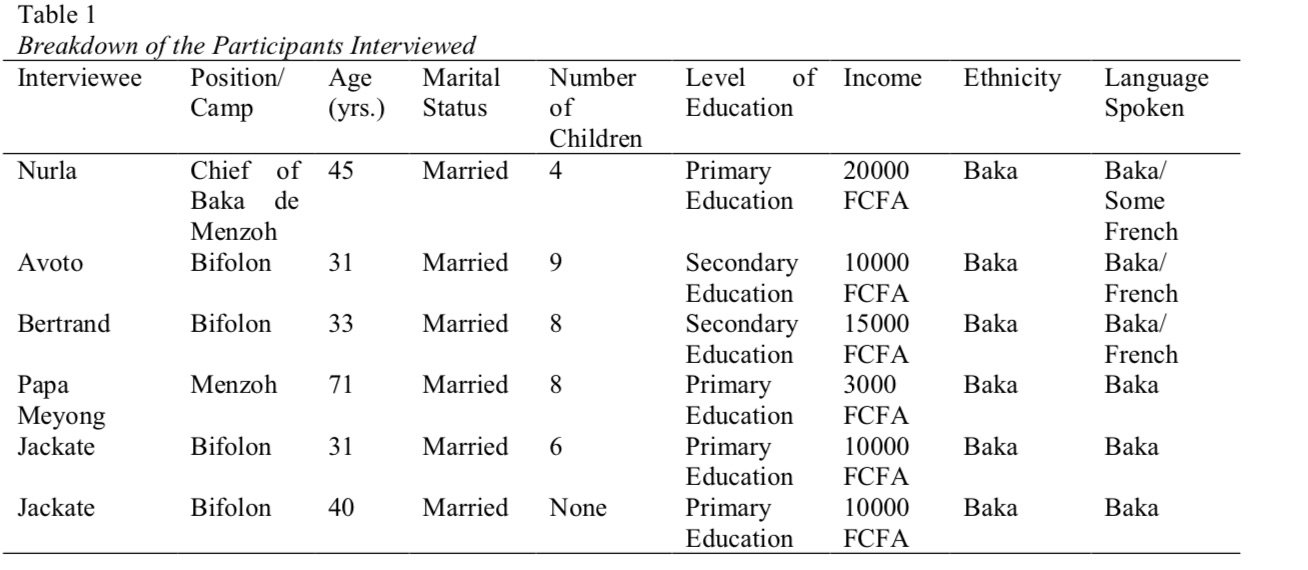
4.2 Themes of the Research Findings
The findings of this research were separated into themes obtained from the in-depth included the desire by Baka people to be recognized by others. Sub-themes comprise the desire to be supported by their government, the need to be educated as a means of lifting themselves out of poverty, and the need for the younger generation to become more culturally sensitive about their own culture.
4.2.1 Major Theme One: Need for recognition and an end to Baka exploitation.
The first major theme established from the research findings was based on the first sub- question of the investigation, which desired to find out the kind of future the Baka people are looking forward to and the possible impediments to such a future. This theme pointed to the view that the Baka people are in need of recognition, especially in the face of exploitation by their Bantu counterparts. The Baka indigenous people believe that their future can be greatly improved if the Bantu group stops mistreating and/or exploiting them. Six participants (100%) of the total sample studied shared this experience. Table 2 contains the major themes and sub-themes that pertain to the question of what kind of future the Baka people are looking forward to, and what may constitute the impediments to such a future.
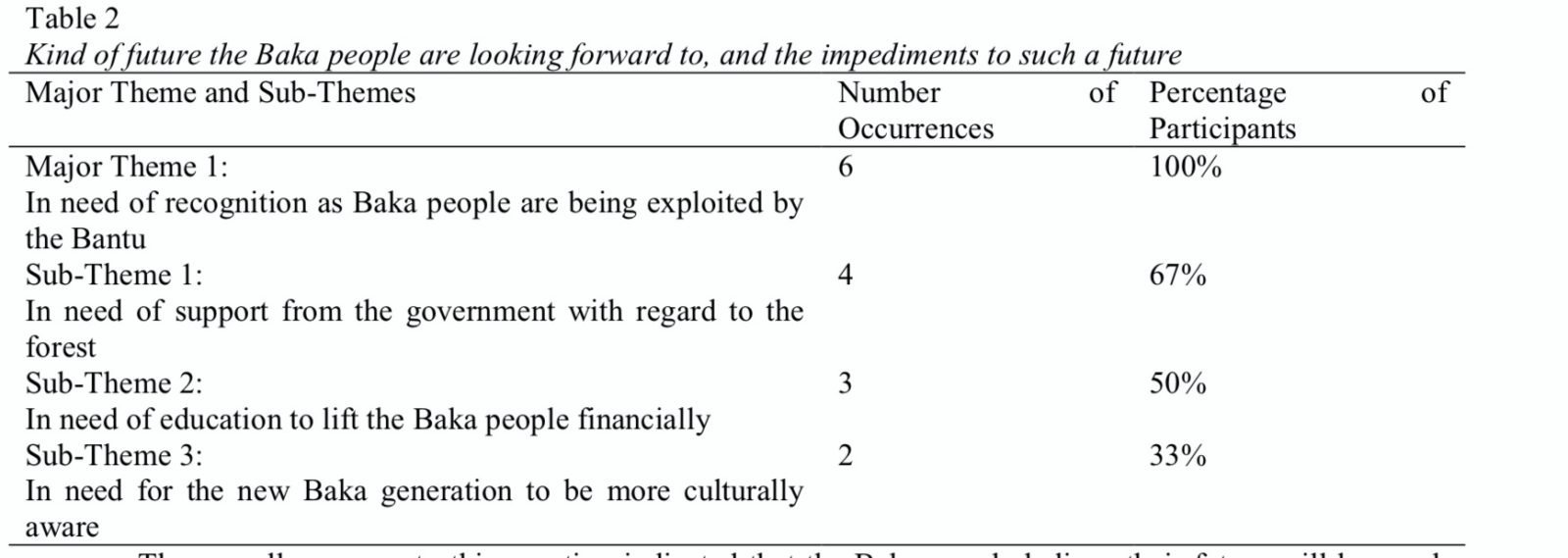
The overall response to this question indicated that the Baka people believe their future will be much brighter if others start to recognize and respect them as equal human beings, rather than people who are sub- human. This perception was one of the five most noteworthy findings of the research. For example, Nurla, who was one of the research participants, admitted that the Baka people were currently not being protected because their Bantu neighbors do not consider their existence as important. They are subjugated and denied recognition by non-Baka individuals. He described their experiences living amongst and with their Bantu fellow citizens as “humiliating”. For example, according to him:
Baka people do not make a lot of money. It’s really bad… Bantu people are exploiting us Baka. It is important that we are protected. In 2001 for example, I was made chief for this village, but the Bantu assume we are not recognized — or that my chieftaincy is not recognized. The Bantu want us the Baka to be under them. Can you imagine that? They do not think we are equals (shakes his head). The district officer says the Baka are not yet recognized. It is so humiliating.
The first sub-theme that emerged was the perception that the Baka people are in need of support from the government with regard to access to the forest. This opinion was shared by four of the interviewees (67%) in the total sample investigated. Avoto, for example, stated that Baka people needed support from the government to keep their forest and save their culture:
The forest is important for our culture. It guards everything about our culture. The problem is that the government is destroying the forest. We do not have elites to protect our forest. We do not know how to defend the forest.
The second sub-theme that emerged from this important question was the perception that the Baka people needed education which will uplift them out of poverty. This opinion was shared by three of the participants (50%). Avoto for example said that their future could develop more if the Baka people had access to education and knowledge. His views were shared in the following manner: “School is important, yes, I believe so. I also think the Baka have to be helped financially. We do not have enough income sources. This remains a challenge for our communities.” Bertrand on his part emphasized the need to live a normal life. He stated that he wanted to see change in their communities through education:
As a Baka person, we want our lives to be like that of every other person in the world. The Baka people have been neglected. We want our lives to change. We are sending our children to school. As Baka people, we have health problems, we need money to pay for things but we do not have any.
The third and last sub-theme that emerged from the study was based on the perception that there was a need for the new generation of Baka youth to be more culturally sensitive, a view shared by two of the participants (33%). Nurla admitted that their children should be more aware of and educated about their culture:
Our children may not understand much about our culture, where we have come from, and where we are going, as a people. That said, I still believe our culture is doing great. We want our children to join the police force, the gendarmerie, be administrators… We are currently not represented in decision-making, which is negatively impacting us as a people.
4.2.2 Major Themes 2 and 3: The need for more opportunities and education to restore dignity and access to other benefits when living at roadsides
The second and third major themes were based on discovering how the Baka people can maximize their newfound freedom, as they now appreciate more opportunities residing at roadsides in the outskirts of the forest, but at the same time they expressed a desire for support services that will further their education, which in their view will restore dignity and access to other benefits. Four of the participants (67%) shared this view. Table 2 contains the major themes and sub-themes pertaining to the sub-question for this section of the study.

Overall, the second major theme described the significance of the Bakas’ transition from forest life to living along major roadsides. This was one of the five most significant findings of the research. For instance, Nurla shared how living by the roadside had given Baka people more access to civilization and opportunities to live normally:
We are very happy to be living by the roadside now. Actually we are. We do not want to go back to the forest. We lived like animals before. We just want to be recognized and given equal status with our Bantu neighbors.
The other major theme identified was based on the sub-question that targeted education as a means of restoring Baka people’s dignity and self-respect. This was one of the five crucial findings of the investigation. By way of illustration, Nurla reiterated the importance of education not only for their future but also as a tool to restore their dignity and respect as humans. The following statement was a true reflection of his words:
Education like I said before is very important, we need to be able to have our dignity restored, and be considered as people who are just as equal to other human beings who are not Baka. We want good things for us. We will like to have good houses; we need healthcare services and other social facilities.
Another sub-theme that emerged was the benefit of having more resources that addressed the basic needs of Baka people currently living on roadsides. This perception was shared by 50% of the total sample population. Bertrand stated that even though their culture was evolving, they believed they had been given more opportunities and resources with which to live:
Our culture in a sense has changed. We now do the things we did not do much like farming. Now we have a variety of food, including cassava, plantains and lots of other foods. Our culture is okay.
One more sub-theme that followed was the opportunity for learning from the older generation of the Baka people as a means of maintaining and enhancing their culture. This perception was shared by 33% of the total sample. As a case in point, Avoto said that learning directly from the Baka people was another approach to preserving their culture, given the contemporary changes in their lives:
I should be able to stay close to my parents to learn about our culture and also pass it on to younger people. That is very important to us as Baka people. That is how we can contribute to our culture.
4.2.3 Major Themes 4 and 5: Satisfaction with life can improve if Baka individuals are treated equally; Baka are satisfied being Baka, as God created them so.
The fourth and fifth major themes were based on the last qualitative sub-question, which was to discover whether Baka people are generally satisfied with any aspects of their lives. Overall, the study found that the Baka people are generally satisfied with life. However, they believed that that satisfaction could improve if Baka individuals are treated equally. Similarly, they proudly stated that they were satisfied being Baka, as they were created so by God. These two major themes were shared by 83% of the sample investigated. Table 3 contains the two major themes and sub-themes pertaining to the second sub-question of the study.

Overall, the fourth major theme of the study was the Baka people’s belief that satisfacción can improve if Baka individuals are treated equally. This was one of the five most important findings of the study. To substantiate this, Nurla admitted that they would be happier if Baka individuals were respected and viewed as equal to other individuals: “I am happy to an extent. We have family to support us, but life could be much better if we were treated as equals to other people, but we are not—at least not yet. We are still viewed as slaves.” Avoto on his part echoed the view that they could be happier and more satisfied with life if others treated them equally and with respect. For example, he said: “I would like to have money; I would like to have an education. I would like to be treated equally like any other person. I would like not to be laughed at when I am going somewhere simply because I am Baka.” Bertrand reiterated that he wants a state of affairs in which Baka people are not mistreated and are respected by other individuals: “First, we want evolution. We do not want people to maltreat us. I want to be viewed like everyone else. I do not want someone to come to my area and give me orders when I have a chief.” Finally, Papa Meyong shared that their lives as Baka people would be better if they were treated equally: “My life has not changed. I would like my life to change in the sense that people know we are Baka and yet treat us fairly.”
The fifth major theme was the general belief that Baka people are satisfied with being Baka, as they were created by God to be Baka people. This was also an important finding of the study. Avoto emphasized that he was happy being a Baka individual, as God had originally created him as one: “I am happy being Baka. God created me Baka, and I am happy.” Bertrand similarly expressed the view that he was happy being Baka and that he would not want to change anything about his identity:
I am happy being Baka. That is what is very important to me. I am happy being Baka, I do not want to change being Baka. When I am Baka, I feel at ease. There is nothing that disturbs me. I am at ease… Yes, generally speaking, I am happy with my life at this point in time.
The first sub-theme was the perception that Baka people are satisfied but need further access to education. 67% of the total population sampled shared this view. Nurla admitted that they were doing fine, but could generally improve if they were given more access to education:
I will say that we have done well, but cannot say for real we are happy. Um-hum, one thing we are asking is that the government should help our children go to school. We need to be educated in order to help our community. Our children do not go to school… Some of us parents do not want them to go to school. We want them to help us at home with income-generating activities. Unfortunately, these children should be in school if the Baka are to survive.
The second sub-theme was the perception that Baka people’s satisfaction can improve if homes were constructed for them. This sub-theme received 67% agreement amongst the total sample. Bertrand described the Baka people as happy, but that they could definitely be happier and more satisfied if homes were built particularly for them: “Baka people are happy. If someone can build us homes and ask us to move into them, we will be happier if that can be done.” Papa Meyong also suggested the need for housing for the Baka people: “The government should give more assistance to Baka people to live better lives, like helping them with seeds for farming, housing, health care and education.” Jackate echoed that satisfaction could be increased if she had a better place to live in: “I would like to have a better place to live, and good health. I do not live in a safe place at the moment, and I am not comfortable. My life should be better.” Finally, Jackate also shared that having proper shelter would bring greater life satisfaction: “I think that the life of an average Baka person should change. In terms of material things, like shelter and basic health, many things need to change about our lives if we are to be happy.”
The third sub-theme was the perception that Baka people’s satisfaction can improve if healthcare support was provided. 67% of participants shared this view. Papa Meyong, for example, stated that there was a need for healthcare support for the Baka people:
I am very happy being Baka; at the same time, I want changes as I have specified. The government should give more assistance to Baka people to live better lives, like helping them with seeds for farming, housing, health care and education.
The fourth sub-theme was the perception that the Baka people are generally happy that they no longer live in the forest. This sub-theme was agreed upon by 33% of the sample. Nurla shared how happy Baka people were that they no longer live in the forest and are now treated as human beings and not animals: “Happy, of course. We are happy we are no longer living in the forest. It has been helpful to us. Now we no longer live like animals, like we used to do before.” Jackate echoed that another source of happiness and satisfaction in life is: “I am happy that I am Baka and that we are no longer living in the forest.”
The fifth to seventh sub-themes received less than 20% occurrences and can be referred to in table 3.
5.0 Discussion
The findings of the study were classified under several major themes and sub-themes. Each of these articulated the real needs of Baka people. The study identified areas where development agents, policymakers, and other interventionists may want to focus their attention for the purpose of improving the wellbeing of Baka people. They should develop programs that are able to promote and enhance the welfare of other minority groups experiencing similar situations. The targeted areas are comprised of three major concentrations. First, effort should be put toward designing programs and policies that will enhance a better future for Baka people; second, programs should target the maximization of the autonomy of Baka people; and third, the programs should be able to improve overall satisfaction with life amongst the Baka people. The approach adopted should emphasize on the main theme plus sub-themes, as expressed by the research participants. Programs as well as policies should adopt a strategy that systematically identifies both risk and protective factors influencing wellbeing, in addition to adopting evidence-based modalities for intervention.
5.1 The Need for Recognition and Respect
Key themes recognized from the thematic analyses pointed to the need for intervention in five main areas, with sub-themes that supported the major areas of concern. The need to institute a system where the Baka people are recognized and respected as a social entity with equal human rights was the first major theme. Existing literature such as found in the works of Achu and Asongu (2015), have described Baka people as stigmatized, despised. and treated like slaves and beggars by their Bantu counterparts. Baka are considered inferior to their Bantu partners, discriminated against very early in life and are facing all forms of stereotypes. The Baka are made to feel that they are inferior to the Bantu populations (Pyhälä, 2012; Simo & Nchoji, 1995; Paulin, 2007). It therefore makes complete sense when they state the need to be recognized by non-Baka people, considering that the relationship that exists between them and their Bantu neighbors is characterized by a system of inequality that does not favor the Baka indigenous people.
5.2 Need for Education and Government Support
The need for recognition was substantiated by three sub-themes: the need for support from the government with regard to allowing Baka people to access forest resources; the need to make education resources more accessible as a means of uplifting Baka people from poverty; and the need for encouragement and support for a new generation of Baka children who are culturally aware of their existing reality, as well as challenges that endanger their culture. In examining the difficulties encountered by the Baka people, it is not sufficient for government to insist on a sedentarization program that will require the Baka people to settle down on logging routes and engage in agriculture (Pyhälä, 2012). Such a policy must be accompanied by provision of the resources and technical know-how that will assist this population with the transition to this new role. This illustrates the lack of government support alluded to in the in-depth interviews. In addition, one of the wishes of the Baka people was to have their children educated. It is believed that such an education will uplift the ethnic group financially from a vicious cycle of poverty. Unfortunately, it will be very difficult to realize this goal if children are not able to go to school either because of an absence of resources, or because children are being teased and marginalized by their fellow Bantu students (Pyhälä, 2012). Without being recognized as people with equal status, Baka indigenous people are marginalized. According to Jack, Ali, and Dias (2014) the Baka people may likely suffer depression under these conditions of severe stressful events. The research findings led to one important aspect of this study, which was to find out how the Baka may maximize their autonomy in the face of a rapidly changing global community where their lives are constantly influenced by realities beyond their own control. Two themes were identified from the interviews that responded to how the Baka people can best be assisted to maximize their autonomy.
5.3 Baka and Maximization of Autonomy
Major themes 2 and 3 posited that the Baka people believe there were more opportunities for them if they were living at the roadsides, as the government had recommended. At the same time, they also believed education was necessary to restore their dignity and make it possible for them to access other benefits. Therefore, it was found that for Baka people to maximize their autonomy, it was essential that the policy of sedentarization should be encouraged in order for Baka people to access opportunities at the roadsides, which were not available when they lived in the forest. This was surprising in the sense that, unlike what was previously thought, inviting the Baka indigenous people to abandon the forest in favor of settling on roadsides was not essentially a bad government policy.
Pyhälä (2012) has described Baka dispossession from their ancestral land (the tropical forest) in problematic ways. Nonetheless, encouraging the Baka people to settle on logging routes will not only ease the government’s ability to keep track of this indigenous people for the purposes of including them in development efforts (Pyhälä, 2012), but also, according to those interviewed, this policy has offered new opportunities for access to resources for the Baka people. At face value, such a policy may have been thought of as negative. However, it is important to note that being asked to leave the forest and settle on roadsides has provided prospects for gaining access to more resources and the acquisition of some degree of formal education. This confirms what Simo and Nchoji (1995) posited: the ability of the Baka people to accept change. Similarly, their desire to have access to resources and opportunities pertains to how generative Baka people are and as discussed by Peterson (2006). Peterson (2006) discussed the concept of generativity within the context of opportunities and constraints provided by society. Available opportunities positively correlate with a generative individual, and an absence of opportunities may accordingly increase concern for generativity on the part of adults who are afraid they may not have something to leave for posterity. According to Pyhälä (2012), the forest remains the basis of the Baka identity, culture and livelihood. Notwithstanding government allocation policies which favor corporate organizations such as logging and mining companies, limiting Bakas’ traditional access to forest resources, the Baka participants interviewed nonetheless felt their culture was in no way under threat of extinction.
5.4 Access to Resources and Preservation of Culture
In addition to the need to access education as a means of maximizing Baka autonomy, there were also other sub- themes. These sub-themes indicated the need to have access to resources that will facilitate a better lifestyle and improve general living conditions for the Baka people. In addition, there was a desire that younger Baka people should be able to access resources that will help them learn from the older generation. The yearning of younger people to learn from the older generation confirms their aspiration to fulfill their generative goals as posited in Erikson’s seventh developmental stage of psychosocial development. This is a major concept underlying this study. Findings indicate Baka people’s ability to be generative and this has a positive and direct influence on satisfaction with life. By wanting the younger generation to learn from their elders, it is believed that this desire is motivated by what McAdams and de St Aubin posited was a cultural demand and an inner desire for the younger generation to behave in a predetermined manner (cited in Hofer et al., 2008). Other themes focused on the need to augment satisfaction with life.
5.5 The Baka and Satisfaction with Life
Major themes 4 and 5 pointed to the view that satisfaction with life among Baka people can be improved if Baka individuals are treated equally like other ethnic groups In-depth interviews targeting this area were based on Diener, Emmons, Larsen, & Griffin’s (1985) concept of satisfaction with life. The semi-structured questions investigated the personal experiences of Baka people and their judgmental perception of subjective wellbeing (SWB). Studies carried out by Paulin (2007) described the relationship between the Baka and their Bantu neighbors as unequal, with the Bakas viewed as inferior to their Bantu counterparts. The themes highlight the view that satisfaction with life amongst the Baka people can be improved upon if Baka individuals were treated as fairly as every other ethnic group. On the other hand, the Baka people interviewed pointed out that the Baka as a group were satisfied because in their words, they were created by God and therefore see no reason to be considered less human. This later point was in response to whether if given the opportunity, would they want to be not born Baka. Notwithstanding their happiness being Baka, they nonetheless are conscious of the fact that they are stigmatized by people who are non-Baka. Being stigmatized and stereotyped are indications of discrimination and disrespect from others (Pinel & Paulin, 2005). The in-depth interviews revealed that Baka people are made fun of, accused of wrongdoing, and experience a host of nonverbal cues that are directed at them. Language used to refer to them by their Bantu neighbors consistently points to an absence of dignity and respect. Such treatment may lead to self-schemas, which are psychological structures that necessitate an organized set of clearly held and personally valued beliefs about the self, and which consequently influence social information processing. Other consequences include health and psychological complications such as depression and supplementary comorbid mental health matters (Jack et al., 2014), which are risk factors that can contribute negatively to wellbeing.
Another interesting sub-theme under these findings includes the view shared by a few of the research participants who advocated a separation of the Baka people from their Bantu neighbors. This view supports their desire for autonomy. They believed that being given their own land or territory would promote their autonomy as a people. According to them, separation will reduce the stress that comes from the constant harassment, brutality, and abuse currently being experienced by Baka people. This is directly related to an inability by government to enforce appropriate regulations that will expedite Baka people’s integration with non-Baka groups while minimizing conflict that may result from two divergent cultures coming together. According to Kelman (2008), conflict increases the chances of human distress, and this threatens wellbeing and the survival of the human species. Being displaced from ancestral lands due to government policies and conservation efforts has forced the Baka Forest People into encounters that threaten their way of life and happiness. This is characterized by what Popova (2014) implied were experiences suffered by other indigenous people. People forced from their lands and abandoned at the mercy of poverty, with chances of survival impeded by relationships that Alfred and Corntassel (2005) have described were built on colonial legacies and practices that oppressed minority groups, even in the so-called independent nations.
5.6 Research Limitations
This research had important limitations worth considering. For example, the sample size of six may not be thought of as representative of the views of the total population being studied. Moreover, the utilization of purposive sampling approach possibly limited the range of responses that could have been obtained. However, the choice of sample was based on the characteristics of the population and objectives of the study (Palys, 2008). This was based on identifying people with expert knowledge who were able to identify the real needs of the Baka people in in-depth interviews. In addition, since this was qualitative research, researcher bias cannot be disregarded (Creswell, 1998). In any study, especially those which have adopted the cross-cultural approach, the influence of researcher bias plays an important role. For example, the interpretation of the results of the findings were influenced by researcher bias. In addition, the utilization of Western concepts in examining non-Western communities is problematic. Unfortunately, there were no available equivalent concepts for this ethnic group. It is possible therefore that the psychological concepts may not have had much resonance with this particular population.
5.7 Recommendations
The findings of this study directly impact public policy. For example, program intervention and how research on issues impacting the wellbeing of indigenous and other minority groups can be conducted. Any form of intervention to improve the wellbeing of the Baka indigenous people in the central African region should not ignore the various areas of concern illustrated by the findings of this study. According to the International Labor Organization (2013), “indigenous and tribal peoples shall enjoy the full measure of human rights and fundamental freedoms without hindrance or discrimination,” as stated in Article 3(1), ILO Convention, No. 169. Any public policy interventions by policymakers must be built within the framework of this article. In addition, any form of intervention should be evidence-based, a view shared by the American Psychological Association (APA). According to the APA, prevention programs should be evidence-based and relevant to the community’s interest. Such programs need to be ethical and target problem behaviors, while at the same time enhancing health-supporting behaviors (Romano, 2015). Interventions for this population should be framed within the context of the Baka culture and should incorporate the socio-cultural contextual variables that may be enhancing the population’s risk factors (Jack, Ali, and Dias, 2014). This view is also shared by Imada (2004) as well as Ellemers and Haslam (2012). It is therefore suggested that interventions that target the Baka people’s subjective wellbeing should take a comprehensive strategic approach that incorporates not only expertise and the involvement of important stakeholders, but also a strategy that empowers the Baka indigenous populations to be energetically involved in the decision-making processes.
5.8 Suggestions for Future Research
To be able to improve the wellbeing of the Baka people, major players who partake in Baka life and wield power need to acknowledge that the Baka people are experiencing varied forms of injustices, that their human rights are abused, and that they are oppressed both by individuals and the existing system. If the outgroup is preoccupied with their own hurts, as argued by Goodman (2001), it will be impossible for them to acknowledge the Baka people’s suffering. Therefore, it is important that the dominant group’s concerns are also acknowledged. Without the inclusion of these other significant actors, tackling the problem of the Baka indigenous people will be difficult. This implies that any future research should adopt an all-inclusive approach that incorporates significant other parties who influence the wellbeing of the Baka indigenous people. This should be done with the understanding that, without the dominant group examining their own hurts and dealing with them, it will be difficult for them to acknowledge the suffering of others.
5.9 Conclusion
In conclusion, the premise of this study was grounded in the view that there were certain daily challenges faced by the Baka Forest People for which they were not responsible. These challenges directly impact the human rights of the Baka people and consequently their wellbeing. Employing a qualitative research methodology and the administration of in-depth interviews to a selected number of Baka people, opinions suggested by them, targeted three important areas that need intervention. Those interviewed recommended what could be done to maximize the Baka people’s autonomy and what in their view will enhance their future happiness. In addition, a crucial area mentioned by them, was the management of forest resources. Popova (2014) hypothesized that conservation efforts when forced on indigenous people unleashes poverty. Therefore, an important approach should include how to involve the Baka indigenous people in decisions revolving around the management of forest resources. It is hoped that listening to the voices of the participants in this study and adopting the findings as portrayed, policymakers, development agents, and other stakeholders will not grope in the dark, but will instead be successful in devising winning programs that meet the development and psychosocial needs of BakaForest People.
References
Achu, F. N. & Asongu, N. A. (2015). Development challenges amongst the Baka people of the eastern region of Cameroon: An anthropological perspective. International Journal of Innovation and Applied Studies, 12(2), 440-446.
Alfred, T., & Corntassel, J. (2005). Being Indigenous: Resurgences against contemporary colonialism.Government and Opposition, 40(4), 597-614.
Chandra, K. (2006). What is ethnic identity and does it matter? Annu. Rev. Polit. Sci., 9, 397-424.
Creswell, J. W. (1998). Qualitative inquiry and research design: Choosing among five traditions. Thousand Oaks, CA: Sage Publications.
David, E. R. (2013). Internalized oppression: The psychology of marginalized groups. New York, NY: Springer Publishing Company.
Diener, E., Emmons, R. A., Larsen, R. J., & Griffin, S. (1985). The Satisfaction with Life Scale. Journal of Personality Assessment, 49, 71-75.
Ellemers, N., & Haslam, S. A. (2012). Social identity theory. In P. M. Van Lange, A. W. Kruglanski, E. T.
Higgins, P. M. Van Lange, A. W. Kruglanski, E. T. Higgins (Eds.), Handbook of theories of social psychology (Vol. 2) (pp. 379-398). Thousand Oaks, CA: Sage Publications Ltd.
Fai, R. D. (2016). Generativity, Identity, and Life Satisfaction: A Mixed Methods Investigation of the Baka in Cameroon (Doctoral dissertation, THE CHICAGO SCHOOL OF PROFESSIONAL PSYCHOLOGY).
Gilbert, J., Couillard, V., Kenrick, J. and Kidd, C. (2009). Land rights and the Forest Peoples of Africa: Historical, legal and Anthropological perspectives. Retrieved July 13, 2013 from the Forest Peoples Programme. http://ssrn.com/abstract=1403958
Goodman, D. (2001). Promoting diversity and social justice: Educating people from privileged groups. Thousand Oaks, Calif: SAGE Publications, Inc.
Guastello, D. D., Guastello, S. J., and Briggs, J. M. (2014). Parenting style and generativity measured in college students and their parents. SAGE Open, 4(1), 2158244013518053.
Hofer, J., Busch, H., Chasiotis, A., Kärtner, J., and Campos, D. (2008). Concern for generativity and its relation to implicit pro-social power motivation, generative goals, and satisfaction with life: a cross-cultural investigation. Journal of Personality, 76(1), 1-30. doi:10.1111/j.1467-6494.2007.00478.x.
Imada, T. (2004). Generativity as Social Responsibility: The Role of Generations in Societal Continuity and Change. In E. de St. Aubin, D. P. McAdams, T. Kim, E. de St. Aubin, D. P. McAdams, T. Kim (Eds.), The generative society: Caring for future generations (pp. 83-95). Washington, DC, US: American Psychological Association. doi:10.1037/10622-006
International Labor Organization. (2013). Indigenous and Tribal Peoples. Retrieved July 14, 2013 from http://www.ilo.org/indigenous/lang–en/index.htm
Jack, D. C., Ali, A., & Dias, S. (2014). Depression in multicultural populations. In F. L. Leong, L. Comas-Díaz, G. C. Nagayama Hall, V. C. McLoyd, J. E. Trimble, F. L. Leong, … J. E. Trimble (Eds.), APA handbook of multicultural psychology, Vol. 2: Applications and training (pp. 267-287). Washington, DC, US: American Psychological Association. doi:10.1037/14187-016
Kelman, H. C. (2010). Conflict resolution and reconciliation: A social-psychological perspective on ending violent conflict between identity groups. Landscapes of Violence, 1,1, 5. DOI: 10.7275/R5H12ZX0 Available at: http://scholarworks.umass.edu/lov/vol1/iss1/5
Léonard, Y. (2011). Baka oral narratives: A cultural and linguistic analysis and some implications for Bible translation. Yaoundé: SIL Cameroon
Leonard, Y. (1997). The Baka: A people between two worlds. Retrieved July 29, 2013 from http://www.collectionscanada.gc.ca/obj/s4/f2/dsk2/ftp03/MQ26821.pdf
McAdams, D. P. (n.d). American identity: The redemptive self. The General Psychologist. pp. 20-27. doi:10.1037/e537272009-009
McAdams, D. P. (2006). The redemptive self: Generativity and the stories Americans live by. Research in Human Development, 3 (2&3), 81-100
McAdams, D. P., Hart, H.M., & Maruna, S. (1998). The anatomy of generativity. In D.P. McAdams and E. de St. Aubin (Eds.), Generativity and adult development: How and why we care for the next generation (pp. 7-43). Washington, D.C.: APA Press.
McAdams, D. P., Diamond, A., de St. Aubin, E., and Mansfield, E. (1997). Stories of commitment: The psychosocial construction of generative lives. Journal of Personality And Social Psychology, 72(3), 678-694. doi:10.1037/0022-3514.72.3.678
McAdams, D. P., de St. Aubin, E., and Logan, R. L. (1993). Generativity among young, midlife, and older adults.Psychology and Aging, 8, 221-230.
McAdams, D.P., and de St. Aubin, E. (1992). A theory of generativity and its assessment through self-report, behavioral acts, and narrative themes in autobiography. Journal of Personality and Social Psychology,62, 1003-1015
Ngala, K. C. (2016, January 29). Baka caught in the maze of modernism. Inter Press Service News Agency. Retrieve from http://www.ipsnews.net/2013/12/baka-Forest People-caught-maze-modernism/
Ngala, K. (July, 2012). Ancient Baka culture in Cameroon under threat. Retrieved from http://www.dw.com/en/ancient-baka-culture-in-cameroon-under-threat/a-16088853
Ohenjo, N. O., Willis, R., Jackson, D., Nettleton, C., Good, K., & Mugarura, B. (2006). Health of indigenous people in Africa. The Lancet, 367(9526), 1937-1946.
Palys, T. (2008). Purposive sampling. In L. M. Given (Ed.), The Sage Encyclopedia of Qualitative Research Methods. (Vol.2). Sage: Los Angeles, pp. 697-8.
Paulin, P. (2007). The Baka of Gabon: The Study of an Endangered Language and Culture. Retrieved July 26, 2013 from http://www.ddl.ish-lyon.cnrs.fr/fulltext/Paulin/Paulin_2007_FEL.pdf http://www.survivalinternational.org/news/10794
Peterson, B. E. (2006). Generativity and successful parenting: an analysis of young adult outcomes. Journal of Personality, 74(3), 847-869.
Phelan, S. M. (2010). Evaluating the implications of stigma-induced identity threat for health and health care (Order No. 3434298). Available from ProQuest Dissertations & Theses Global. (845911386). Retrieved from http://search.proquest.com.tcsedsystem.idm.oclc.org/docview/845911386?accountid=34120
Pinel, E. C., & Bosson, J. K. (2013). Turning our attention to stigma: An objective self-awareness analysis of stigma and its consequences. Basic and Applied Social Psychology, 35(1), 55-63.
Popova, U. (2014). Conservation, traditional knowledge, and indigenous peoples. American Behavioral Scientist, 58(1), 197-214. doi:10.1177/000276421349504
Pyhälä, A. (2012). What future for the Baka? Indigenous peoples’ rights and livelihood opportunities in south- east Cameroon. Copenhagen: IWGIA
Romano, J. L. (2015). Recommendations for developing, implementing, and evaluating prevention interventions.In, Prevention psychology: Enhancing personal and social well-being (pp. 131-142). Washington, DC, US: American Psychological Association. doi:10.1037/14442-008
Simo, M. J., & Nchoji, N. P. (1995). Nature and human development among the Baka Forest People: Concepts and perceptions. Retrieved July 23, 2013 from http://ignca.nic.in/ps_05020.htm
Tajfel, H., & Turner, J. (1979). An integrative theory of intergroup conflict. In W. G. Austin & S. Worchel (Eds.), The Social Psychology of Intergroup Relations (pp. 33-47). Monterey, CA: Brooks/Cole.
Article published at: www.iiste.org
Research on Humanities and Social Sciences www.iiste.orgISSN (Paper)2224-5766 ISSN (Online)2225-0484 (Online)
Vol.6, No.22, 2016




